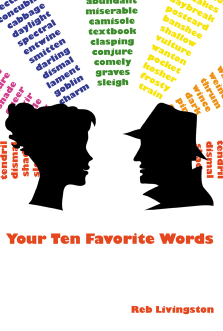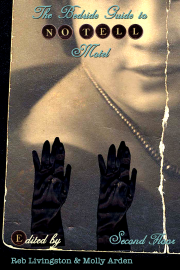Let Me Tell You What You Can Do With That Ladder
In a comment below Simmons asks: "Thanks for passing that on Reb. I followed up to Laurel's post with a set of questions: I wonder if the perspective is the same for "older" students---say mid-30s on---who decide to pursue an MFA. Is it the same ladder? Do they find the same mentoring "opportunities?" Is it a similar but parallel world, or do they fit into the same game?"
Let me start by saying no poet needs an MFA. Some poets find it useful, others find it to be a waste of time, some are mixed and apathetic about their experience. At the risk of repeating myself incessantly, an MFA won't get you published, a teaching job, any kind of job, etc. It gives you an opportunity to study writing with (hopefully) skilled poets and meet some peers. You can study writing and develop a community a lot of other ways too. I see no reason to take a pro or anti MFA stance and find the arguments on both sides ridiculous.
An MFA doesn't make you a "master" of poetry just like an MBA doesn't make you a "master" of business, if we're using a definition that "master" means "expert". An MFA doesn't make you a more serious poet. The degree is not a golden ticket.
To answer Simmons' question, it really depends on the program. There are tremendous differences. I know people who went to Iowa and New School and Pitt and so on, and none of their descriptions are remotely similar. When I was at Bennington from '99 - 2001, the average age for a student was 37, I think. From what I hear, the average is now younger, but there are still a number of "older" students. I honestly believe age played no role in the kind of attention one got at Bennington. Of course, I also didn't experience the "ladder" that Laurel describes at Iowa.
My experience at Bennington was incredibly non-competitive. Yes, if somebody we considered unworthy published a book or placed a poem somewhere, we'd make our catty comments. Such is life. But that wasn't the usual atmosphere. There was no "Bennington" voice -- of the 7 poets in my class, we each had dramatically different writing styles and interests. Being a low-residency program -- there wasn't that influence to be like everyone else. Every semester one studies with a new mentor, so one mentor doesn't wield an excessive amount of influence either.
I have no idea what the rates are at other MFA programs, but pushing 5 years after graduation -- only 2 out of the 7 of us are still writing regularly -- that I know (unless somebody is being super-secretive). None of us have a full-length collection published. During the program and immediately after, most placed work in publications, got some notice with a honorable mention or semi-finalist in contests, some did some part-time teaching, etc. That's not enough to sustain writing. It has to be something outside of all that crap. It's possible, like Laurel, some of those folks may go back to writing regularly later, when life slows down, kids start school, etc. Being a writer means writing and that has nothing to do with a ladder.
I think Laurel's whole point was "fuck the ladder" and "fuck the game" -- just write and if you want your work to have an audience, focus on publishing in places that have that audience. If you don't know of a place that has "that" audience, be "creative" and make a place/thing for that audience.
If you're interested, I've written other things about MFAs on this blog:
April 12, 2004
June 7, 2004
October 8, 2004
November 2, 2004 (the post that earned me several nasty messages from FW, genius poet)
November 11, 2004






5 Comments:
In my experience (school shall remain nameless, but was "ranked" #5 when I attended), competition and mentoring issues were ugly. With a full ride, TA, and the supposed "best" portfolio of the students in my year, I landed there a golden child (strange indeed after years of undergrad writing profs pretty much loathing my stuff). The Biggest Name poetprof kept a very small circle around her (1 or 2 students per year) and asked me to pick her for my thesis advisor a year before I had to pick, returned my emails but not those of other students in my class who had traveled thousands of miles and paid thousands of dollars to work specifically with her (she was not the reason I chose the school--at all--and was a very distracted teacher, not the rigorous kick in the ass most of us needed [my chosen advisor, a not-very-well-known poet, was a brilliant teacher and hard-ass]). Big Poetprof could (why do I feel like an asshole saying this, when it's true? I guess because I do dig her work, and she's not a bad person) hardly be bothered to critique the work of students who didn't interest her. In workshop, she'd usually have me read my critique first, then add simply, "What Emily said." In addition, special opportunities (like dinners with visiting poets) were supposedly decided by lottery; we all put our names in. Year after year, the favored two or three SOMEHOW won each lottery. Resentment was high and I became a nervous wreck, feeling like I had to prove with each poem that I deserved the attention.
Only one of the poets in my class has had a book published. He was low on the totem pole, a paying student who never won lotteries or in-program awards or attention. I haven't seen it (it's pretty knew), but my guess is that BigPoet gave it a glowing blurb.
Emily -- I applied to that "nameless" school and was devastatede when I didn't get in. Things happen for a reason. Now I'm glad they didn't take me.
And I find the idea of "ranking" MFA programs hysterical.
Oh, me too. Hence the quote marks.
Two more gems I remember: BigPoet batting lashes at me and saying "How come you're the only graduate student who doesn't blush when I come near?" [eek! eek!] and asking me to write a recommendation that she win a college-wide teaching award. It was a very delicate operation (I didn't feel I could say no, but I wasn't going to lie, quite) and I know she wasn't flattered by the end result. But I did at least leave out the parts about her regularly skipping one to two thirds of a class to go get a latte while we all taught each other.
Will say that the other female prof in the MFA poetry staff at the time was phenomenal. I still think of her with awe.
Thanks for posting these---interesting conversation. A poetry professor who teaches in the local MFA program recommended a far-away low-residency program over his own university program (he teaches in both) solely based on my age (which is only 36 after all!). Perhaps the low-residency programs in general are for the more mature (and in a way less laddery) among us?
Post a Comment
<< Home